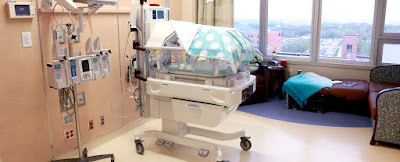The Neonatal Intensive Care Unit (NICU)
The birth of a baby is a wonderful yet very complex process. Many physical and emotional changes occur for mother and baby.
A baby must make many physical adjustments to life outside the mother's body.
Which babies need special care?
Most babies admitted to the NICU are premature (born before 37 weeks of pregnancy), have low birth weight (less than 5.5 pounds), or have a medical condition that requires special care. In the U.S., nearly half a million babies are born preterm, and many of these babies also have low birth weights. Twins, triplets, and other multiples often are admitted to the NICU, as they tend to be born earlier and smaller than single birth babies. Babies with medical conditions such as heart problems, infections, or birth defects are also cared for in the NICU.
The following are some factors that can place a baby at high risk and increase the chances of being admitted to the NICU. However, each baby must be evaluated individually
IVF TREATMENT:
IVF is the best type of ART (Assisted Reproductive Technology) and includes a progression of ventures to treat fruitlessness. In IVF, the egg is joined with the sperm outside the lady's body ideally in a lab. To place it in straightforward words, it includes extraction of the eggs from the ovary, at that point treating it with the sperm of the male accomplice in the lab bringing about the arrangement of developing lives. Of these incipient organisms the best ones are exchanged back to the female accomplice's body wherein it keeps on developing for the rest of the 9 months of pregnancy. Louise Brown was the primary unnaturally conceived child conceived through IVF in 1978 in England. Almost 5 million children are conceived through IVF everywhere throughout the world.
It is a tedious, costly and obtrusive strategy and is regularly utilized when the various strategies for treatment have fizzled. IVF utilizes the couple's own particular eggs and sperm yet contributor eggs
Fibroid Surgical treatment:
Surgery is indicated when There is excessively enlarged uterine size. Pressure symptoms like difficulty in passing urine or stools, increased frequency of passing urine are present. Medical management is not sufficient to control symptoms. The fibroid is submucous and fertility is reduced.
Surgical options include:
Surgery is indicated when There is excessively enlarged uterine size. Pressure symptoms like difficulty in passing urine or stools, increased frequency of passing urine are present. Medical management is not sufficient to control symptoms. The fibroid is submucous and fertility is reduced.
Uterine fibroids are non-destructive (generous) developments that create in the mass of the uterus and are the most successive tumors of the female genital tract. Fibroids extend in measure from few a millimeters to a couple of centimeters.
Advantages of uterine fibroid embolization:
*Released on same day (Daycare method) or following day
*Quick recuperation inside


